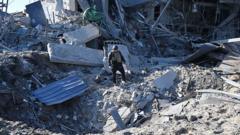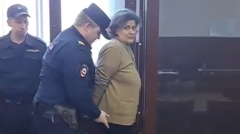Ukraine's Foreign Ministry is demanding an explanation from FIFA after a map presented during the 2026 World Cup draw excluded Crimea, a territory internationally recognized as part of Ukraine, yet occupied by Russia since 2014. The map showcased countries with geopolitical tensions where teams cannot face each other, including Ukraine, but failed to represent Crimea as Ukrainian territory. Heorhiy Tykhy, a spokesman for the ministry, labeled this oversight an "unacceptable error" and accused FIFA of endorsing "Russian propaganda" and violating international law.
FIFA Faces Outcry from Ukraine Over Crimea Map Error

FIFA Faces Outcry from Ukraine Over Crimea Map Error
Ukraine calls for FIFA to publicly apologize for a map that inaccurately depicts Crimea, sparking tensions over the territory's status.
Tykhy took to social media platform X to voice the nation’s grievances, echoing the sentiment that FIFA's actions could indirectly support ongoing hostilities. He provided a corrected version of the map, emphasizing Crimea as an integral part of Ukraine. The Ukrainian Football Association has formally addressed FIFA and UEFA officials, expressing dismay over what they deemed an inconsistent stance from the organizations regarding Ukraine's territorial integrity, despite previous resolutions acknowledging Crimea’s status.
FIFA is yet to respond to the uproar, as discussions intensify leading up to the tournament set to begin in June 2026, with Ukraine positioned in Group D alongside Iceland and Azerbaijan. The incident highlights the ongoing geopolitical tensions surrounding Crimea and underscores the importance of accurate representation in global sporting events.
As the 2026 World Cup approaches, FIFA's handling of political sensitivities in maps and branding continues to draw scrutiny.
FIFA is yet to respond to the uproar, as discussions intensify leading up to the tournament set to begin in June 2026, with Ukraine positioned in Group D alongside Iceland and Azerbaijan. The incident highlights the ongoing geopolitical tensions surrounding Crimea and underscores the importance of accurate representation in global sporting events.
As the 2026 World Cup approaches, FIFA's handling of political sensitivities in maps and branding continues to draw scrutiny.





















